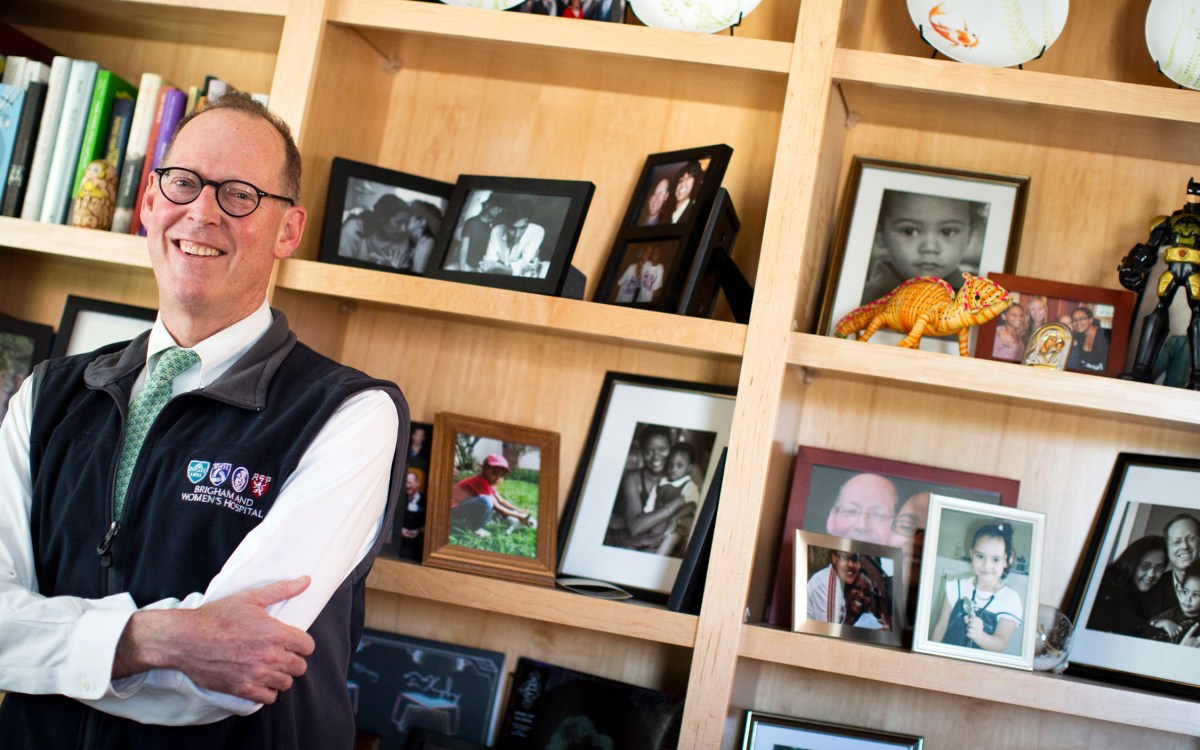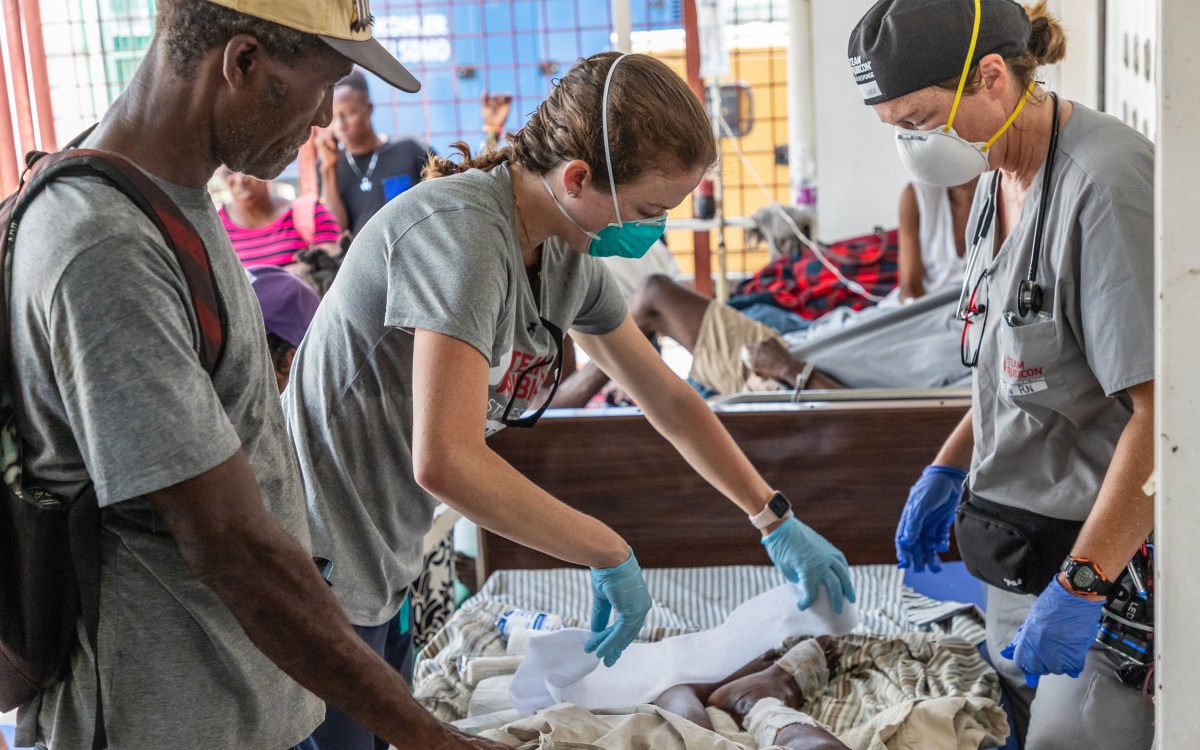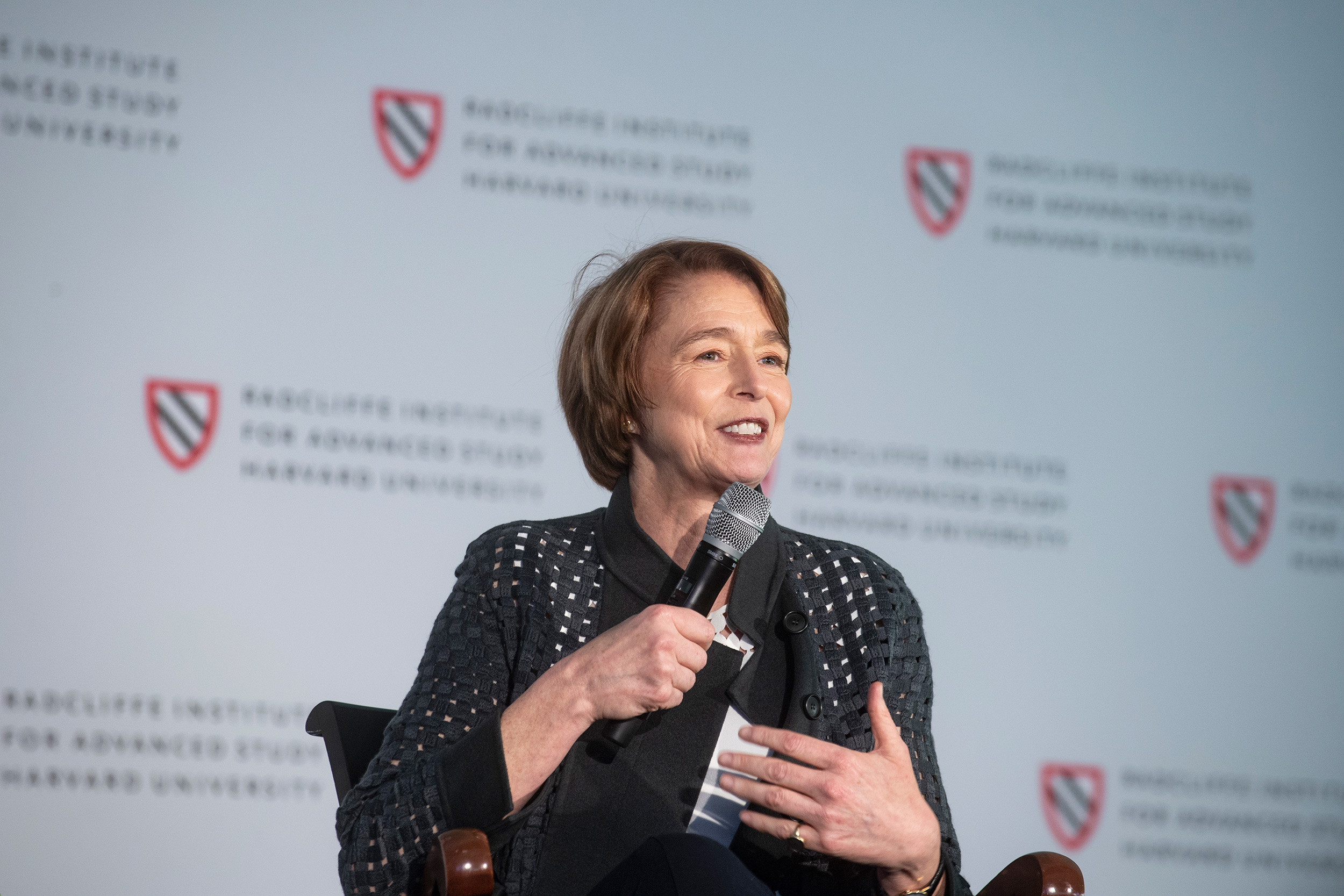
In 1987, Ophelia Dahl co-founded the nonprofit Partners In Health, which has provided healthcare to millions of patients in the poorest and most vulnerable communities around the world.
Photos by Ann Hermes
Unyielding belief in possibility of delivering healthcare for global poor
Co-founder Ophelia Dahl receives Radcliffe Medal for her work with Partners In Health
The 2023 Radcliffe Medal recipient Ophelia Dahl is often described as an optimist. At Radcliffe Day on May 26, she confirmed it, and said that her refusal to accept that she cannot change things has driven her life’s work.
“I took a leap of faith,” said Dahl of her 18-year-old self, who went to Haiti to volunteer and met some of the people with whom she would eventually co-found Partners In Health (PIH) in 1987, including the late global health pioneer Paul Farmer, who was then preparing to enter Harvard Medical School. The nonprofit, which has served millions of patients, provides healthcare to the poorest and most vulnerable communities around the world by partnering with local institutions, governments, and communities.
Dahl was the organization’s executive director for 16 years and now chairs its board of directors. She told Radcliffe Day attendees that seeing others in such abject poverty made her realize she had a moral obligation to help.
“I saw for the first time just how dire the situation was in which people were forced to live,” she said. Those conditions were not owing to choice or personal failure but rather systems and historical forces like displacement, slavery, and colonialism. It struck Dahl, daughter of award-winning actress Patricia Neal and renowned writer Roald Dahl, that she had come from great privilege, not just in terms of money, education, and opportunity but even in being encouraged from a young age to believe in the possibility of a better future.
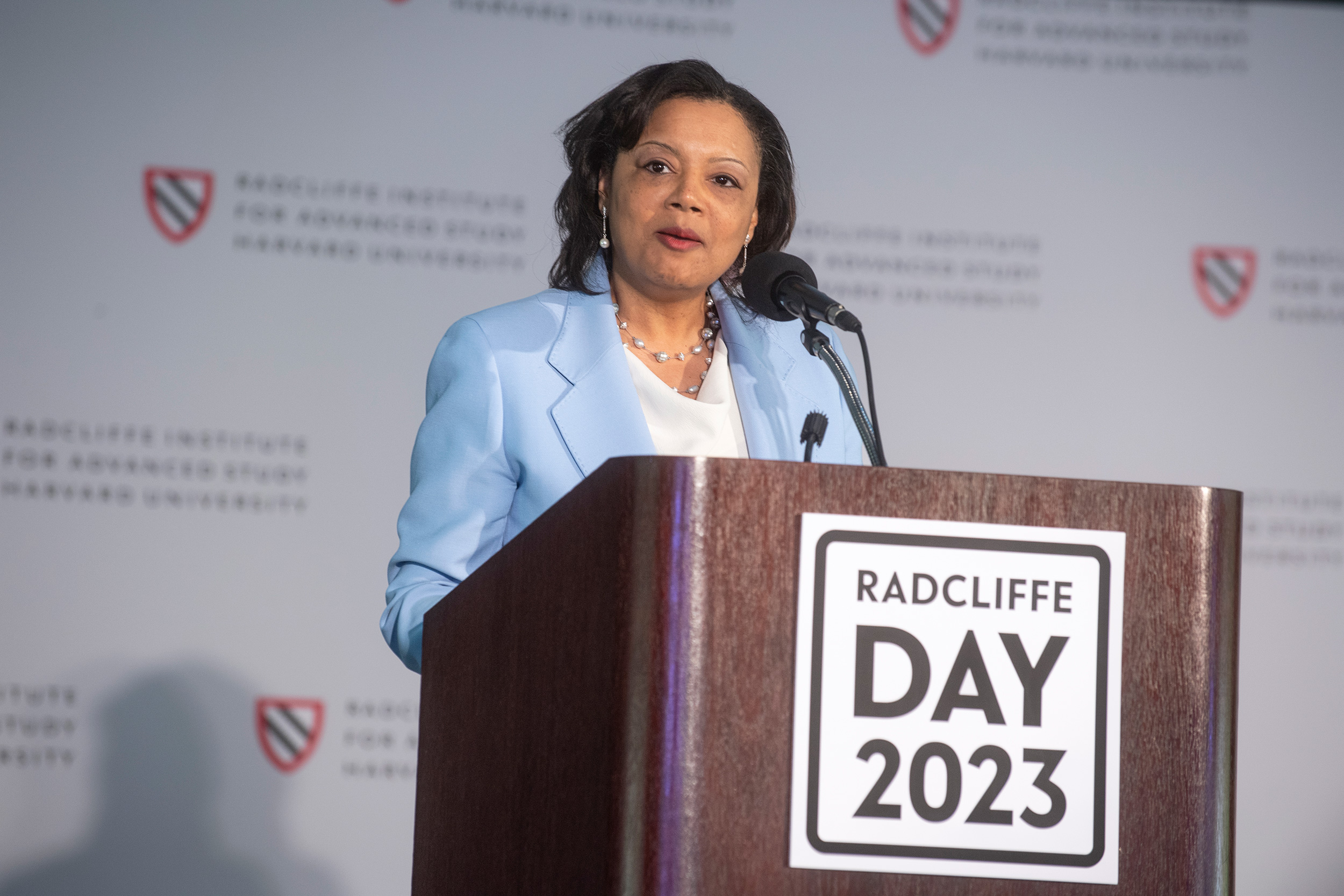
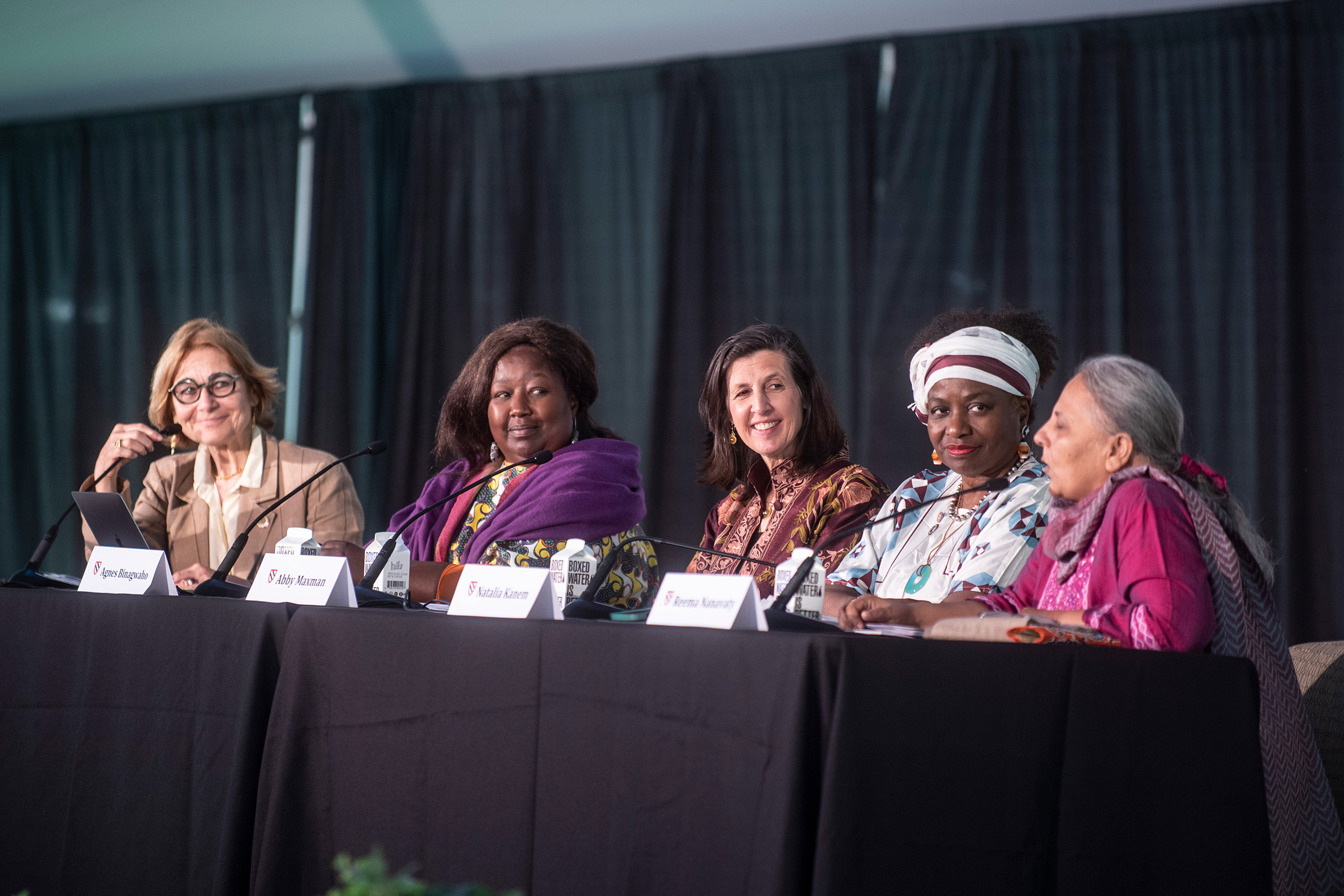
Dean Tomiko Brown-Nagin and panelists (from left) Jacqueline Bhabha, Agnes Binagwaho, Abby Maxman, Natalia Kanem, and Reema Nanavaty.
John Green, PIH trustee and best-selling author of “The Fault in Our Stars,” shared the stage with Dahl during the keynote conversation. He mentioned the success the nonprofit has had in making healthcare more accessible but acknowledged that there’s still a long way to go. He asked Dahl how she balanced the belief that incremental change is possible while not being “infuriated” by how slow progress can be.
“If you’re too patient … then it’s a disaster for many people,” she said. “But there’s something about change that lasts and that often takes longer to cement. And that means partnerships have to be forged, and people have to be trained.” One thing that she has found encouraging is the value of experience. For example, what may have taken 15 years to accomplish in the past can now be done in a handful of years. That progress is palpable.
Radcliffe Institute Dean Tomiko Brown-Nagin, who introduced Dahl and presented her with the Radcliffe Medal, said that the global heathcare leader has characterized pessimism as “a luxury of privilege,” which if left unchecked breeds indifference. She described Dahl’s optimism as an “intentional choice.”
“She keeps fighting, and in so doing inspires all of us to do the same,” said Brown-Nagin.
During her time at Partners In Health Dahl has brought strong leadership and courage to the task of overcoming long-held assumptions about the possibilities of bringing modern healthcare to underdeveloped areas around the globe, the speakers said. And the great lesson of her success has been that the creation of change doesn’t begin with global policy but through local efforts and up through every level of operation.
“Ophelia’s life teaches us what is possible when a fierce intellect and an unbounded imagination are matched with a capacious heart and unflinching purpose to advance global health equity,” said Chelsea Clinton, vice president of the Clinton Foundation, who shared her experience working with Dahl while serving on PIH’s board of trustees.
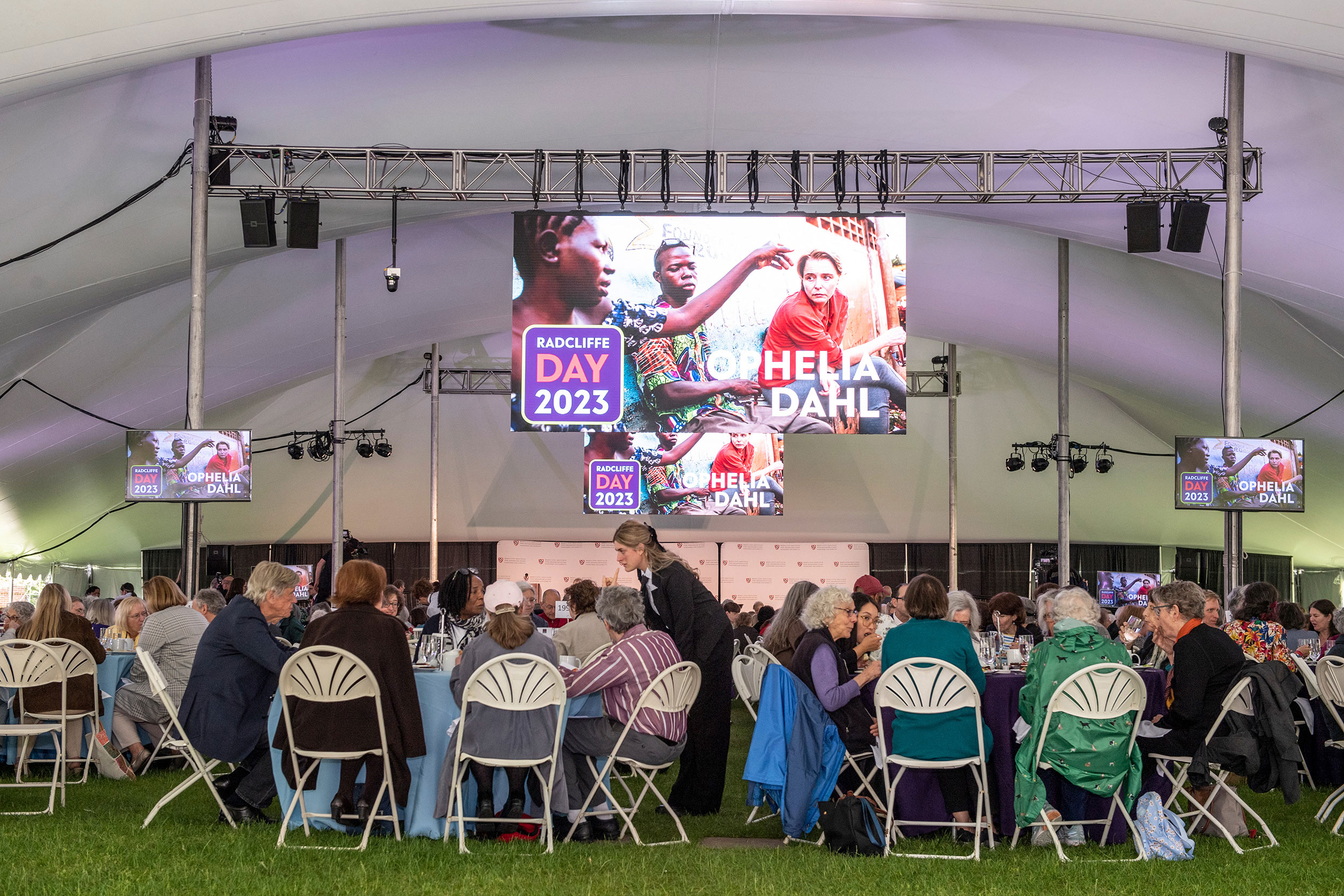
Clinton, who also teaches at Columbia University Mailman School of Public Health, said that beyond Dahl’s work advancing global health, she’s also an example of how to lead during hardship. She was crucial in leading PIH after the passing last year of Farmer, Harvard Medical School professor and beloved member of the team. Dahl, in the midst of enormous grief, pushed forward and continued to press forward and inspire the work of their partners.
“Ophelia taught us so much about what means to be a leader. We don’t only get to lead when it’s easy,” Clinton said. “We often have to lead when it’s hard, when it’s ugly, when it’s painful, and that is when we see the true spirit of leadership.”
During the event, attendees listened to a panel discussion centered around the essential role of female leaders in global health. Panelists Agnes Binagwaho, Natalia Kanem ’76, Abby Maxman, and Reema Nanavaty offered their perspectives during the discussion. The panel was moderated by Jacqueline Bhabha, a professor of the practice of health and human rights at the Harvard T.H. Chan School of Public Health, the Jeremiah Smith Jr. Lecturer in Law at Harvard Law School, and an adjunct lecturer in public policy at the Harvard Kennedy School.
“Ophelia’s life teaches us what is possible when a fierce intellect and an unbounded imagination are matched with a capacious heart and unflinching purpose to advance global health equity.”
Chelsea Clinton
“[Health] is the pillar in the middle of everything that concerns human development,” said Binagwaho, the vice chancellor of the University of Global Health Equity, an initiative of PIH. Maxman, president and CEO of Oxfam America, said a common mantra during the pandemic was: “No one is safe until everyone is safe.” This is a reminder that there is still so much work to be done when it comes to achieving gender equity in healthcare. The key to this is uplifting more women as leaders.
Nanavaty, who has worked with the Self Employed Women’s Association for more than 35 years and is currently a member of the Advisory Council on Gender and Development of the World Bank Group, said that to do this we must recognize that all women are leaders. She sees the most promise in empowering women at the local level to be leaders in their communities.
“We have needlessly made health more corporate than cooperative,” Nanavaty said during the panel. “Women as leaders do not lead and pull people behind … they help other women lead.”
During her remarks, Clinton praised Dahl for giving so much of herself to the world and for lifting up those around her to do the same.
“Thank you, Ophelia, for teaching us about what is possible with enough will and grit and determination and love,” she said. “Thank you for proving what is possible, again, to all of us every day.”



